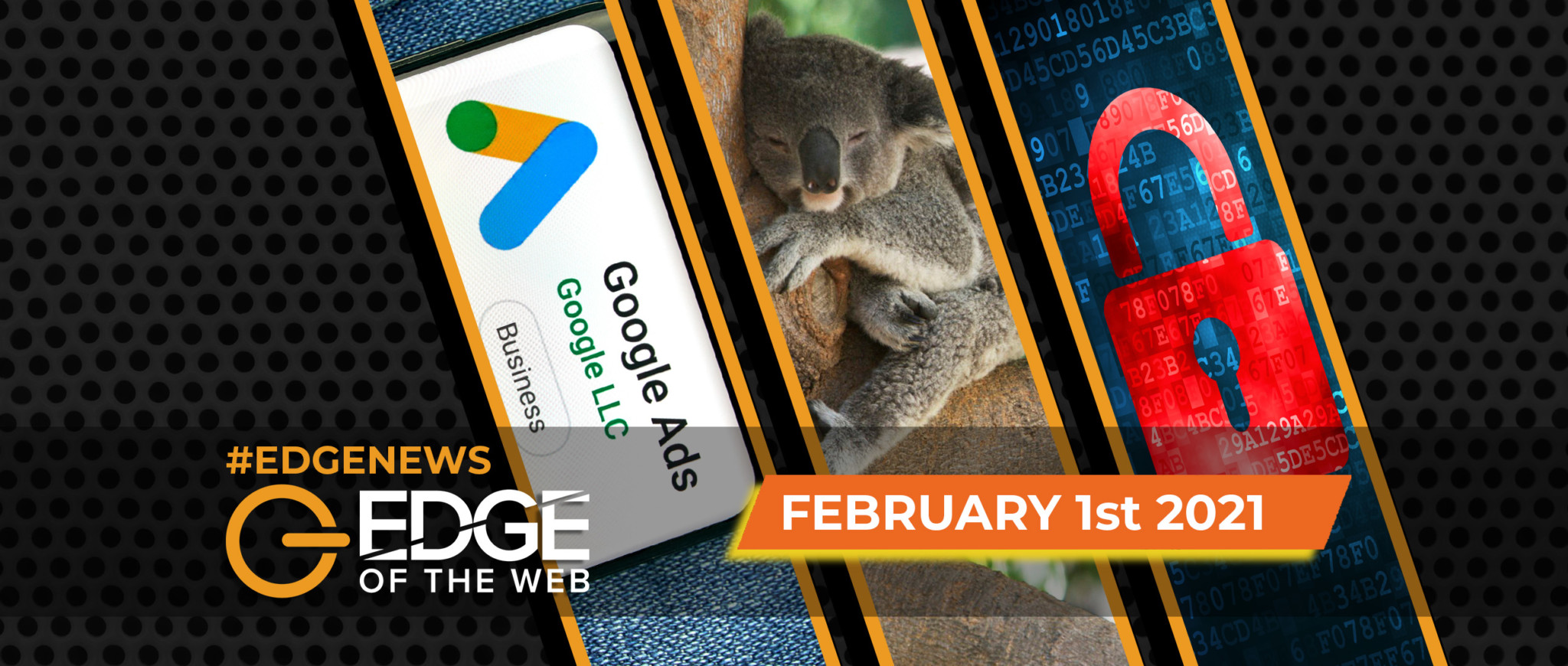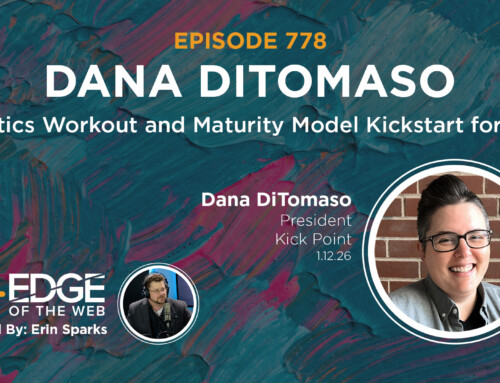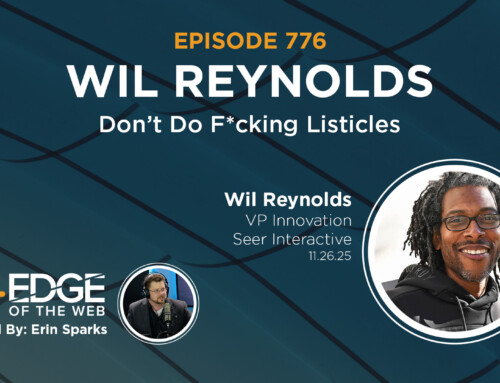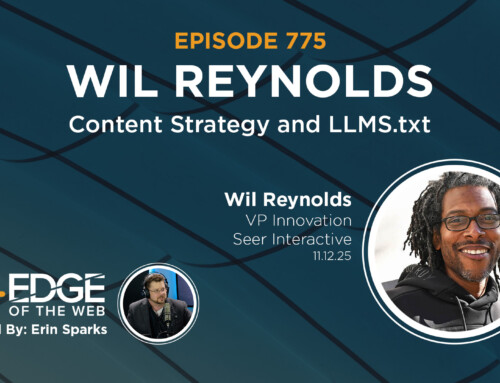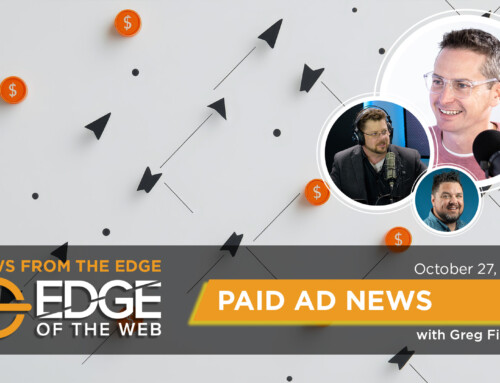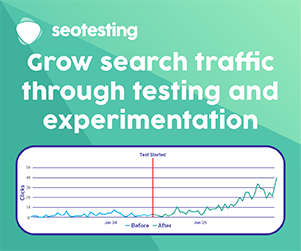February 1, 2021
It’s a busy week at the EDGE news desk with stories such as how Google’s local services ads (Google Guaranteed) are impacting regular Google Ads accounts, how Google is now spinning its ongoing battle with Australia, and a new privacy standard that privacy advocates hope will actually work. Host Erin Sparks and Studio Creative Director Jacob Mann along with Mordy Oberstein, Wix’s SEO Liaison, cover these headlines and more in this week’s news roundup, episode 390 of the award-winning EDGE of the Web podcast!
How are local service ads impacting Google Ads accounts?
From Joy Hawkinson Search Engine Land: How are local service ads impacting Google Ads accounts? In September 2020, Google launched local services ads to lawyers. Since her agency works with a lot of lawyers, she was very curious to see how these ads impacted where people click in the search results. At first, she assumed these ads were stealing clicks from the local pack results but were surprised to find that although it did lower the click-through-rate of the Google My Business listings, the average impact was only a loss of about 5 clicks a month. However, when she looked at several Google Ads accounts for several lawyers, it told a very different story.
- Erin Sparks: Joy Hawkins is a true local search expert, so this story coming from her means there’s something to it. These local service ads were launched a couple years back and they’re both industry-specific and backed with a Google Guaranteed badge. They’re meant to generate direct leads to approved businesses, who do have to jump through a bunch of hoops to get approved. But the question is whether or not these local service ads are detracting from their regular Google Ads account and the local-pack ads. And Google is pushing companies into this local service option.
- Mordy Oberstein: It totally makes sense from Google’s perspective to push advertisers into the Google Guaranteed local service ad options because it basically acts like a rich result, and it’s presumably better for consumers, right? Regular ads from a lot of local companies can feel pretty spammy, but if it’s carrying that Google Guaranteed badge, then it’s a higher level of quality.
- Erin Sparks: Yes, in the regular Google My Business space, there were so many fly-by-night operations that weren’t even real. One of our clients at Site Strategics is a garage door company and it was extensive the amount of live-stream proof we had to provide showing all their trucks with the company logo and all their equipment and people working to prove to Google it was a real operation.
- Mordy Oberstein: The real rub here is this: Why doesn’t Google actually just clean up the spam algorithmically? You know they could, right? But no, they create a new program companies have to buy into and pay extra in order to get that Google Guaranteed badge of approval rather than actually cleaning up the mess.
- Erin Sparks: Even worse is when you layer in how Google has taken away so many of the long-tail, low-volume keywords from even being reported (and which are important to some niche businesses), plus if any of the leads (phone calls) that come in to your business from the local services ads are bogus, it’s up to YOU as the Google customer to push back and say it was bogus or spam because otherwise Google is going to count it toward the quota of leads they guaranteed you’d get in a period for buying into the local services option. It just starts to feel like a lot of things are working against you in your local marketing efforts through Google.
- Mordy Oberstein: And you know the fly-by-night operations who see your Google Guaranteed badge are going to spam-call your phone number just max out your guaranteed leads because is the business really going to go through the complaint process?
- Erin Sparks: Yes, and that countering process takes several days, like at least three or four days if you’re really on top of it. So now you’re spammed out of actually getting anything out of local services and your regular Google Ads are pushed out of relevancy.
Google Australia Adds Notice to Search Results About News Links Law
Over on Search Engine Roundtable is a story by Barry Schwartz about Google Australia Adds Notice to Search Results About News Links Law. Google has added a large noticeable banner to the top of the search results in Google Australia for any query. The banner reads “Google Search is in the news. “You may have heard about a proposed law. We are willing to pay to support journalism. Hear our proposal.” The button goes to a short YouTube video Mel Silva, Managing Director for Google Australia, explaining Google’s case and offer.
- Erin Sparks: In the video, Mel says “Paying for links breaks the way search engines work, and it undermines how the web works too.” So that’s not really an offer to pay anything, but then why did they agree to pay something in France?
- Mordy Oberstein: Exactly! And black hat SEOs everywhere are loving the confirmation that paying for links does in fact break the way search engines work, so they’re all patting themselves on the back. And you have to remember it’s about the terms of any such law, right? So the Aussies want Google to actually divulge information about their search algorithm and when it’s going to be updated as part of the deal, and that’s just a deal-breaker for Google, which is why they sent veiled threats last week about just turning search off for all of Australia. The video message from Google Australia had a whole lot of spin trying to appeal to the average folks with its language and so forth. I mean come on, if paying for links breaks the web, then does paying for a link to appear above the organic search results break the web? BECAUSE THAT’S CALLED AN AD and Google sells a lot of those.
Global Privacy Control Wants to Succeed Where Do Not Track Failed
From Russell Brandom on The Verge we see Global Privacy Control Wants to Succeed Where Do Not Track Failed. A new web standard is playing off of California’s powerful privacy law. Privacy groups are hoping that a new standard, called Global Privacy Control, will change that. It’s designed as a global opt out, a general signal that users want as little data collection and sharing as possible. In particular, the GPC standard will let users signal that they don’t want services to share their data with third-party data brokers, something that is outside the reach of most modern privacy tools.
- Erin Sparks: Everyone by now has experienced how one simple website visit results in you getting hit with tons of remarketing ads on your social media accounts. The privacy tools in place now are rather nominal at best. This GPC standard would be an opt-out (not an opt-in) to help protect their data and interrupt those data flows. But websites would have to respect the standard. GPC would automate the process by letting you do a global opt-out through your browser so each website you visit gets the message automatically to not mess with your data.
- Mordy Oberstein: So the technology advanced and most people didn’t realize what was really happening with their data. Now people are waking up to it and pushing back. And the push-back is going to get harder. I say good on the browsers who are getting ahead of this curve to make it easy and automatic for people to protect their data. Automatic opt-out is the way it should be. Besides, you don’t need to opt-in at any website. If you want to shop for something, just go to Facebook and do some searches on that type of product, wait three seconds, and then you’re get all the remarketing ads you’d ever want right there in your FB feed and you’ll be all set! That’s what I do. You don’t have to actually go to any actual business website to accomplish your shopping.
- Erin Sparks: What? You mean actually putting users in control of it? But how are marketers going to get the data we need (he asked somewhat facetiously)?
- Mordy Oberstein: Yes, well, God forbid marketers would actually do some real, old-fashioned market research. Oh, the horror!
Last week the entire SEO community was shocked and saddened at the passing of Hamlet Batista, Founder and CEO of RankSense and known for his expertise in Python and SEO automation. And he was just a really good person. You can visit a special memorial website set up to honor Hamlet at https://www.seopythonistas.com, where you’ll also find a link to the gofundme page to support Hamlet’s family. Needless to say, last week’s SEO chat session was cancelled. But Mordy and the gang are back this week for the Thursday 1pm eastern time #SEOchat discussion on Twitter, and the special guest is Maddy Osman to get the discussion started on creating badass content that ranks AND resonates, so join in if you’re interested!
Connect with Mordy Oberstein, Wix’s SEO Liaison
Twitter: @MordyOberstein (https://twitter.com/MordyOberstein)
LinkedIn: https://www.linkedin.com/in/mordy-oberstein-12551715/
Connect with Erin Sparks, Host of EDGE of the Web and CEO of Site Strategics
Twitter: @ErinSparks (https://twitter.com/erinsparks)
LinkedIn: https://www.linkedin.com/in/erinsparks/



 –>
–>